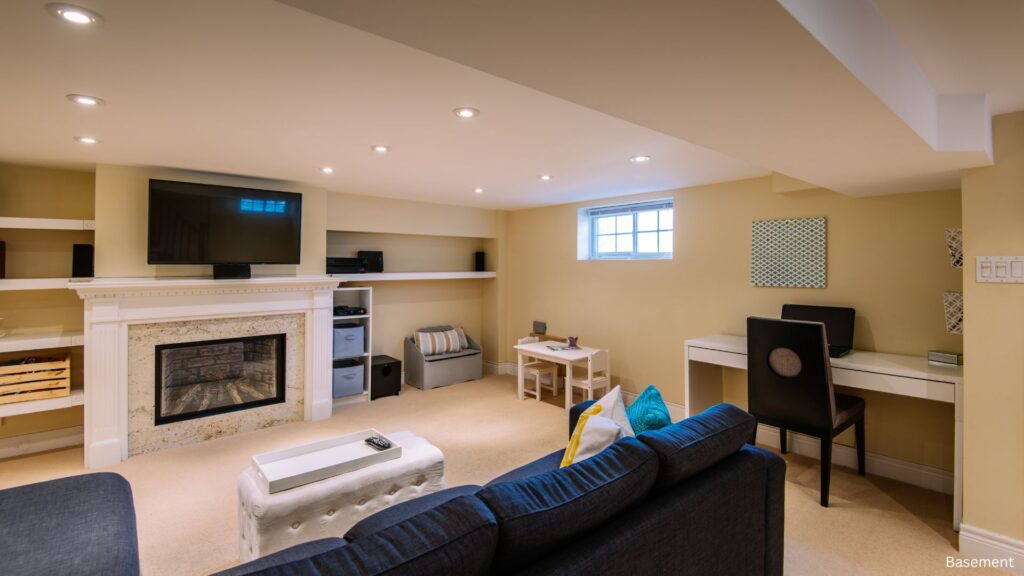Basement Finishing Cost in 2025: What Homeowners Should Know
The average basement finishing cost in 2025 is around $32,000, but it can range anywhere between $2,800 and $100,000, depending on your location, contractor, and desired features. Costs can climb significantly if you’re starting from scratch or planning to add bathrooms, kitchens, or custom elements.
Basement Finishing Cost Breakdown
1. Unfinished Basement
If you’re starting from a blank slate, building an unfinished basement can cost $4,000 to $37,500, or $30 to $100 per square foot. This includes the cost of foundational work.
2. Half-Finished Basement
A partially finished space might only need selective upgrades, with costs ranging from $7 to $23 per square foot. Homeowners typically spend less on these projects since only a portion of the basement is being updated.
3. Basement Remodel
Remodeling a previously finished basement—say, updating flooring, lighting, or layout—costs $4,200 to $45,000, with an average around $20,000.
Cost per Square Foot
Generally, basement finishing costs fall between $7 and $23 per square foot. Here’s a quick look at estimated costs by size:
| Basement Size (sq ft) | Estimated Cost Range |
|---|---|
| 500 | $3,500 – $11,500 |
| 750 | $5,250 – $17,250 |
| 1,000 | $7,000 – $23,000 |
| 1,500 | $10,500 – $34,500 |
| 2,000 | $14,000 – $46,000 |
What Contributes to the Basement Finishing Cost?
The overall basement finishing cost depends on several core components:
Materials (70%)
Drywall, insulation, flooring, and paint make up the majority of your budget. Expect to spend:
-
Drywall: $1,750
-
Insulation: $700 – $2,000
-
Flooring: $1,500 – $4,500
-
Paint: Around $1,800
Labor (20%)
Hiring professionals adds convenience but comes with a price. Contractors usually bundle labor into their quotes, which includes plumbing, electrical, framing, and general construction work.
Permits (10%)
Expect to pay $1,200 to $2,000 for building permits, depending on your city or state. Some municipalities charge 1–2% of the total renovation cost.
Popular Add-Ons and Their Costs
-
Electrical (lighting, wiring, outlets): $5,300
-
Plumbing: $45 – $200/hour
-
Framing: Around $1,800
-
Ceiling (drywall/drop ceiling): $1,610
-
Windows (egress): $200 – $950 each
-
Sump Pump Installation: $575
-
Waterproofing: $4,400 average
-
Exterior Basement Door: $2,500 – $10,000
DIY vs. Hiring a Pro: Which is Better?
While DIY basement projects can save on costs, it’s not always worth the risk. Electrical work, plumbing, and permitting require expert knowledge. A professional ensures your basement meets code and is safe to use.
That said, you can save by doing demolition, painting, or trim work yourself—just make sure you’re up for the challenge.
DIY Basement Finishing
✅ Pros:
-
Lower Overall Costs: Save significantly on labor expenses, which can account for up to 20% of your total basement finishing cost.
-
Control Over the Process: You decide the pace, materials, and finishing touches, which gives you creative freedom.
-
Satisfaction and Skill Building: Completing a project yourself can be rewarding and help you develop valuable home improvement skills.
-
Flexible Timeline: Work on your schedule without relying on a contractor’s availability.
❌ Cons:
-
Time-Consuming: Projects can take weeks or even months, especially if you’re balancing work and family commitments.
-
Requires Skill and Tools: Plumbing, electrical work, and framing require experience and specialized tools. Mistakes can be costly—and dangerous.
-
Permit Challenges: Navigating local building codes and securing permits can be confusing for first-timers.
-
Risk of Lower-Quality Work: Poor workmanship may reduce your home’s value or cause safety issues down the road.
💡 Tip: Consider DIY-ing lighter tasks like demolition, painting, or installing trim, but leave structural, electrical, or plumbing work to licensed pros.
Hiring a Professional Contractor
✅ Pros:
-
Expertise and Quality Work: Licensed contractors bring experience, training, and access to skilled subcontractors.
-
Code Compliance: Pros understand building codes and can pull permits on your behalf, avoiding legal or safety issues.
-
Efficient and Timely: Contractors have the team and tools to get the job done faster, reducing project duration and disruption.
-
Warranty and Insurance: Many contractors offer warranties, and their insurance covers any accidental damage or injuries during the project.
❌ Cons:
-
Higher Costs: Hiring professionals can increase your overall basement finishing cost due to labor and management fees.
-
Less Control: You may need to compromise on certain materials or design elements based on your contractor’s recommendations or timelines.
-
Scheduling Constraints: Popular contractors book up quickly, and delays can happen due to availability or material shortages.
How to Save on Basement Finishing Costs
-
Stick to a Budget: Set a cap early and avoid impulse upgrades.
-
Reuse Existing Layout: Placing bathrooms near current plumbing lines saves money.
-
Mix & Match Materials: Pair budget-friendly items with a few standout features.
-
DIY Select Tasks: Handle painting or finishing touches yourself if you’re confident.
Will Finishing a Basement Add Value?
Absolutely. A finished basement can yield a 64% to 70% return on investment. Natural light, open layouts, and moisture-resistant materials are especially valuable to homebuyers. Spending $10,000 on your basement could increase your home’s value by $6,400 to $7,000.
Is a Finished Basement Worth It?
In 2025, the basement finishing cost remains a worthwhile investment for homeowners who want to add living space, functionality, and value to their property. Whether you’re doing a simple remodel or a full transformation, understanding the costs and planning accordingly will help ensure a smoother renovation journey.



